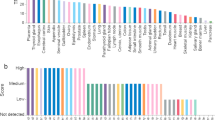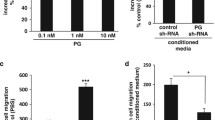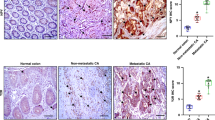Abstract
We conducted this study to evaluate the impact of the expression of peroxisome proliferator-activated receptor delta on angiogenesis in tissue samples of colorectal cancer. We examined 52 samples of primary human colorectal carcinomas and matched normal adjacent tissues to evaluate the expression of peroxisome proliferator-activated receptor delta, cyclooxygenase-2, vascular endothelial growth factor-A, and CD34 through immunohistochemical analysis. Peroxisome proliferator-activated receptor delta was expressed in 25 (48.1%), and cyclooxygenase-2 was expressed in 26 (50.0%) of total colorectal cancer tissues. Tissue samples were divided into four groups, according to the expression of peroxisome proliferator-activated receptor delta and cyclooxygenase-2. The positive rate of vascular endothelial growth factor-A, the levels of microvascular density, and the incidence of venous vessel invasion in peroxisome proliferator-activated receptor delta (+)/cyclooxygenase-2 (+) samples exceeded significantly those in the other three groups of tissue samples (P < 0.05). The results suggest that the axis of the cyclooxygenase-2/peroxisome proliferator-activated receptor delta signal pathway might play a crucial role in the development of colorectal cancers by enhancing angiogenesis.



Similar content being viewed by others
References
Willson TM, Brown PJ, Sternbach DD, Henke BR. The PPARs: from orphan receptors to drug discovery. J Med Chem. 2000;43:527–550. doi:10.1021/jm990554g.
Kliewer SA, Forman BM, Blumberg B, et al. Differential expression and activation of a family of murine peroxisome proliferator-activated receptors. Proc Natl Acad Sci USA. 1994;91:7355–7359. doi:10.1073/pnas.91.15.7355.
Kliewer SA, Lehmann JM, Milburn MV, Willson TM. The PPARs and PXRs: nuclear xenobiotic receptors that define novel hormone signaling pathways. Recent Prog Horm Res. 2000;54:345–367.
Spiegelman BM. PPAR-gamma: adipogenic regulator and thiazolidinedione receptor. Diabetes. 1998;47:507–514. doi:10.2337/diabetes.47.4.507.
Peters JM, Cattley RC, Gonzalez FJ. Role of PPAR alpha in the mechanism of action of the nongenotoxic carcinogen and peroxisome proliferator Wy-14,643. Carcinogenesis. 1997;18:2029–2033. doi:10.1093/carcin/18.11.2029.
Reddy JK, Chu R. Peroxisome proliferator-induced pleiotropic responses: pursuit of a phenomenon. Ann NY Acad Sci. 1996;804:176–201. doi:10.1111/j.1749-6632.1996.tb18616.x.
Tontonoz P, Singer S, Forman BM, et al. Terminal differentiation of human liposarcoma cells induced by ligands for peroxisome proliferator-activated receptor gamma and the retinoid X receptor. Proc Natl Acad Sci USA. 1997;94:237–241. doi:10.1073/pnas.94.1.237.
Mueller E, Sarraf P, Tontonoz P, et al. Terminal differentiation of human breast cancer through PPAR gamma. Mol Cell. 1998;1:465–470. doi:10.1016/S1097-2765(00)80047-7.
Sarraf P, Mueller E, Jones D, et al. Differentiation and reversal of malignant changes in colon cancer through PPAR gamma. Nat Med. 1998;4:1046–1052. doi:10.1038/2030.
Brockman JA, Gupta RA, DuBois RN. Activation of PPAR gamma leads to inhibition of anchorage-independent growth of human colorectal cancer cells. Gastroenterology. 1998;115:1049–1055. doi:10.1016/S0016-5085(98)70072-1.
He TC, Chan TA, Vogelstein B, Kinzler KW. PPARd is an APC regulated target of nonsteroidal anti-inflammatory drugs. Cell. 1999;99:335–345. doi:10.1016/S0092-8674(00)81664-5.
Gupta RA, Wang D, Katkuri S, Wang H, Dey SK, DuBois RN. Activation of nuclear hormone receptor peroxisome proliferator-activated receptor-d accelerates intestinal adenoma growth. Nat Med. 2004;10:245–247. doi:10.1038/nm993.
Takayama O, Yamamoto H, Damdinsuren B, et al. Expression of PPARd in multistage carcinogenesis of the colorectum: implications of malignant cancer morphology. Br J Cancer. 2006;95:889–895. doi:10.1038/sj.bjc.6603343.
Harman FS, Nicol CJ, Marin HE, Ward JM, Gonzalez FJ, Peters JM. Peroxisome proliferator-activated receptor-d attenuates colon carcinogenesis. Nat Med. 2004;10:481–483. doi:10.1038/nm1026.
Reed KR, Sansom OJ, Hayes AJ, et al. PPAR delta status and Apc-mediated tumorigenesis in the mouse intestine. Oncogene. 2004;23:8992–8996. doi:10.1038/sj.onc.1208143.
Park BH, Vogelstein B, Kinzler KW. Genetic disruption of PPARd decreases the tumorigenicity of human colon cancer cells. Proc Natl Acad Sci USA. 2001;98:2598–2603. doi:10.1073/pnas.051630998.
Bergsland EK. Vascular endothelial growth factor as a therapeutic target in cancer. Am J Health Syst Pharm. 2004;61:S4–S11.
Wang D, Wang H, Guo Y, et al. Crosstalk between peroxisome proliferator-activated receptor delta and VEGF stimulates cancer progression. Proc Natl Acad Sci USA. 2006;103:19069–19074. doi:10.1073/pnas.0607948103.
Cutler NS, Graves-Deal R, LaFleur BJ, et al. Stromal production of prostacyclin confers an antiapoptotic effect to colonic epithelial cells. Cancer Res. 2003;63:1748–1751.
Wang D, Mann JR, DuBois RN. WNT and cyclooxygenase-2 crosstalk accelerates adenoma growth. Cell Cycle. 2004;3:1512–1515.
Wang D, Wang H, Shi Q, et al. Prostaglandin E(2) promotes colorectal adenoma growth via transactivation of the nuclear peroxisome proliferator-activated receptor delta. Cancer Cell. 2004;6:285–295. doi:10.1016/j.ccr.2004.08.011.
Gupta RA, Tan J, Krause WF, et al. Prostacyclin-mediated activation of peroxisome proliferator-activated receptor delta in colorectal cancer. Proc Natl Acad Sci USA. 2000;97:13275–13280. doi:10.1073/pnas.97.24.13275.
Piqueras L, Reynolds AR, Hodivala-Dilke KM, et al. Activation of PPAR beta/delta induces endothelial cell proliferation and angiogenesis. Arterioscler Thromb Vasc Biol. 2007;27:63–69. doi:10.1161/01.ATV.0000250972.83623.61.
Yonenaga Y, Mori A, Onodera H, et al. Absence of smooth muscle actin-positive pericyte coverage of tumor vessels correlates with hematogenous metastasis and prognosis of colorectal cancer patients. Oncology. 2005;69:159–166. doi:10.1159/000087840.
Onogawa S, Tanaka S, Oka S, et al. Clinical significance of angiogenesis in rectal carcinoid tumors. Oncol Rep. 2002;9:489–494.
Takebayashi Y, Aklyama S, Yamada K, Akiba S, Aikou T. Angiogenesis as an unfavorable prognostic factor in human colorectal carcinoma. Cancer. 1996;78:226–231. doi :10.1002/(SICI)1097-0142(19960715)78:2<226::AID-CNCR6>3.0.CO;2-J.
Rmali KA, Puntis MC, Jiang WG. Prognostic values of tumor endothelial markers in patients with colorectal cancer. World J Gastroenterol. 2005;11:1283–1286.
Choi HJ, Hyun MS, Jung GJ, Kim SS, Hong SH. Tumor angiogenesis as a prognostic predictor in colorectal carcinoma with special reference to mode of metastasis and recurrence. Oncology. 1998;55:575–581. doi:10.1159/000011915.
Acikalin MF, Oner U, Topcu I, Yasar B, Kiper H, Colak E. Tumor angiogenesis and mast cell density in the prognostic assessment of colorectal carcinomas. Dig Liver Dis. 2005;37:162–169. doi:10.1016/j.dld.2004.09.028.
Engel CJ, Bennett ST, Chambers AF, Doig GS, Kerkvliet N, O’Malley FP. Tumor angiogenesis predicts recurrence in invasive colorectal cancer when controlled for Dukes staging. Am J Surg Pathol. 1996;20:1260–1265. doi:10.1097/00000478-199610000-00012.
Frank RE, Saclarides TJ, Leurgans S, Speziale NJ, Drab EA, Rubin DB. Tumor angiogenesis as a predictor of recurrence and survival in patients with node-negative colon cancer. Ann Surg. 1995;222:695–699. doi:10.1097/00000658-199512000-00002.
Jubb AM, Hurwitz HI, Bai W, et al. Impact of vascular endothelial growth factor-A expression, thrombospondin-2 expression, and microvessel density on the treatment effect of bevacizumab in metastatic colorectal cancer. J Clin Oncol. 2006;24:217–227. doi:10.1200/JCO.2005.01.5388.
Bossi P, Viale G, Lee AK, Alfano R, Coggi G, Bosari S. Angiogenesis in colorectal tumors: microvessel quantitation in adenomas and carcinomas with clinicopathological correlations. Cancer Res. 1995;55:5049–5053.
Gunther K, Radkow T, Reymond MA, et al. Angiogenesis and dendritic cell density are not correlated with metachronous distant metastasis in curatively operated rectal cancer. Int J Colorectal Dis. 2003;18:300–308.
Masunaga R, Kohno H, Dhar DK, et al. Cyclooxygenase-2 expression correlates with tumor neovascularization and prognosis in human colorectal carcinoma patients. Clin Cancer Res. 2000;6:4064–4068.
Liang P, Nakada I, Hong JW, et al. Prognostic significance of immunohistochemically detected blood and lymphatic vessel invasion in colorectal carcinoma: its impact on prognosis. Ann Surg Oncol. 2007;14:470–477. doi:10.1245/s10434-006-9189-3.
Acknowledgment
The authors thank the pathology technicians in both Beppu Medical Center (Beppu, Japan) and Kyodo Byori, Inc. (Kobe, Japan) for their excellent assistance.
Author information
Authors and Affiliations
Corresponding author
Rights and permissions
About this article
Cite this article
Yoshinaga, M., Kitamura, Y., Chaen, T. et al. The Simultaneous Expression of Peroxisome Proliferator-Activated Receptor Delta and Cyclooxygenase-2 May Enhance Angiogenesis and Tumor Venous Invasion in Tissues of Colorectal Cancers. Dig Dis Sci 54, 1108–1114 (2009). https://doi.org/10.1007/s10620-008-0465-x
Received:
Accepted:
Published:
Issue Date:
DOI: https://doi.org/10.1007/s10620-008-0465-x




